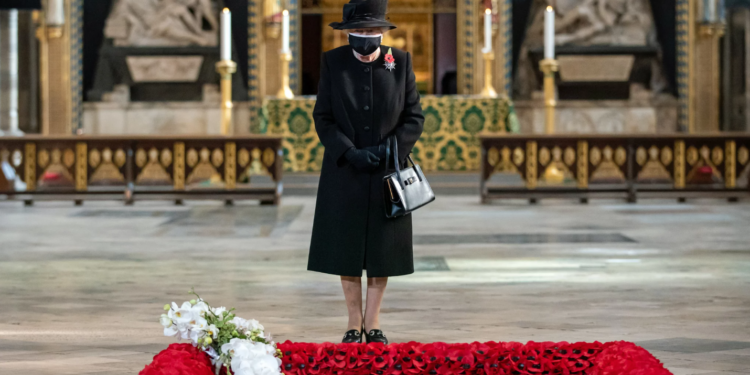For those of us whose lives were not broken in major ways by the effects of lockdown, sometimes it seems as though the experiences of that time are shrinking to a speck in the rearview mirror. We have difficulty remembering exactly how we behaved in 2020, the things we did and the things we stopped doing. This is irritating, because the lockdown tyrants, large and small, seem likely to get away with it just because we’d all rather never think about it ever again. And it’s dangerous because it might make it easier to do the whole thing again next time there’s any kind of plausible-seeming threat.
On the other hand, it’s encouraging in a way, when you remember that, in the depths of the madness, certain SAGE members were cheerily recommending that we could all just wear masks all the time forever. As a scholar, I genuinely feared at one time that real, in-person research seminars might never happen again, especially as so many academics subscribed piously to the Corona Creed. But they do, with trips down the pub afterwards, and the option to attend on Zoom/Skype/Teams/whatever an admittedly quite useful addition. Turns out the human instinct to congregate is very, very strong.
But as memories shrink, fade and fragment, maybe there’s some value in recalling some of it – including those moments when the human spirit triumphed in a small way, and we cherished the hope that our country might not be irrevocably doomed.
So, partly as some small relief from the depressing crisis surround this year’s Armistice Day and Remembrance Sunday, I found myself recalling Remembrance Sunday 2020.
We make a habit of going to the local war memorial for the Remembrance Sunday service. That year, the country had just been plunged into the second lockdown and we weren’t sure what if anything was going to happen or would be allowed. There was an official Remembrance Sunday wreath-laying in London from which the public were excluded, and some conflict over the active debarring of them. But as we weren’t watching the TV none of it registered until later.
Already disconcerted by how difficult it had been to buy poppies (no street sellers), we thought we’d just go and see. At any rate, we’d stand by the war memorial and remember the war dead at 11am. So we put on our coats, rounded up two small children and plodded up to the city centre.
Dotted around the memorial (I would say clustered, but as I recall, people were making a gesture towards staying six feet apart, in case officialdom got sniffy) were a small number of veterans, wearing medals and berets, including a middle-aged officer carrying a poppy wreath and some older men. There were also a couple of police officers hanging around, who indicated that they weren’t going to stop us; I don’t know if that was by pre-arrangement.
We stood around. It got to 11 o’clock. We were silent for two minutes (not that there’d been much talk to fall silent from). I prayed Psalm 130 in my head (“Out of the depths I cry to you, Lord”), as is my wont on these occasions. The poppy wreath was laid at the memorial. One of the veterans recited some of the customary lines: as I recall, it was “For our tomorrow, they gave their today”, followed by “At the going down of the sun and in the morning, we will remember them”.
Then we nodded to each other, exchanged a few polite words the way British people do when they are in danger of emotionally connecting with strangers, and went our ways. I think we nodded at and thanked the police officers too.
2021, the public service was back on. I can’t actually remember if there was much mask-wearing or six-feet-apart business. And poppies are everywhere again (unless you’re the Labour leader, in which case they’re in some places, sometimes). Turns out the ‘instinct’ to wear your poppy with pride is pretty strong too.
Of course, this is a tradition that goes back no further than 1919; not that long, in the grand sweep of history. But this tradition embedded itself because, I think, it fits. It fitted with the culture and character of the nation to which it was offered, and so the nation took it up and into its bruised, war-bereaved heart. It’s never struck me as a ‘jingoistic’ thing; it doesn’t celebrate wars, not even those that were, in essence, just and necessary and whose fallen we can say died for something worthwhile. We simply mourn, together, with humility and dignity.
Certainly since 2020 there’s that wry bitterness. Are we, in fact, losing – or rather, throwing away – all that our grandfathers fought for? What’s the point of honouring them that one day a year, if we effectively rubbish it the other 364? But that’s a reason to step up our game, in defending what’s left and restoring (if we can) what’s lost.
That cold, brief, scattered gathering in 2020 was easily the most moving Remembrance Sunday ceremony I have ever attended. Without fanfare, embellishment or official pomp, it happened because people went out to remember the war dead, at 11 o’clock on Remembrance Sunday. Because it’s what we do.
The author is a post-doc in the arts at a Russell Group university.












To join in with the discussion please make a donation to The Daily Sceptic.
Profanity and abuse will be removed and may lead to a permanent ban.